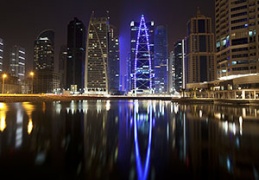04.11.2014

The emirate ranked 39 in a list of 50 top cities for investment, with investments up on an annual basis to $3.68 billion. Dubai's real estate sector is making wave globally and not just because of its headline-making new projects. The emirate is back on the list of top cities for investment, according to a Cushman & Wakefield report. Ranking 186th in the previous list, the emirate is now number 39 among 50 cities with investments up on an annual basis to $3.68 billion.
Focusing in on investor demand, Dubai has announced news that has come as relief for investors in the emirate's real estate sector, reviving several projects where development had been halted during the financial crisis. The six projects were part of the Best Homes portfolio and will now be managed by Q Developments.
Increased investor attention might be one sign that the market is on its way up, but another clear indicator is the performance by some of the market's leading developers. Emaar Properties has recorded a profit of $678 million, 37% higher than what was recorded in the year before. Mohammad Alabbar, chairman, Emaar Properties, said: "This has been a record nine-month performance for Emaar as we delivered on our promise of strengthening shareholder value. We set an industry milestone by announcing a total dividend of AED17.12 billion this year through our strategic growth initiatives including the distributions approved by the shareholders at the beginning of this year and the dividends proposed for distribution before the end of this year."
While the focus on the end-user is clearly evident, Dubai has always managed to stay in the news as a result of his record-breaking feats with real estate. The emirate has its eyes on another 'tallest tower,' announcing plans to build the world's largest twin towers - the Dubai Twin Towers - which will be located at the Dubai Creek.
Earlier in the year, experts were concerned about Dubai heading towards a property bubble similar to the one in 2008. However, it has become increasingly apparent that the emirate has learnt its lessons, responding to the needs of investors and buyers. While prices may have skyrocketed over the past year, the market has responded quickly towards the needs of the end-users with rents falling in many key residential areas. With new developments in the pipeline, the market is bound to regulate itself, stablising as a result of increased supply.
Focusing in on investor demand, Dubai has announced news that has come as relief for investors in the emirate's real estate sector, reviving several projects where development had been halted during the financial crisis. The six projects were part of the Best Homes portfolio and will now be managed by Q Developments.
Increased investor attention might be one sign that the market is on its way up, but another clear indicator is the performance by some of the market's leading developers. Emaar Properties has recorded a profit of $678 million, 37% higher than what was recorded in the year before. Mohammad Alabbar, chairman, Emaar Properties, said: "This has been a record nine-month performance for Emaar as we delivered on our promise of strengthening shareholder value. We set an industry milestone by announcing a total dividend of AED17.12 billion this year through our strategic growth initiatives including the distributions approved by the shareholders at the beginning of this year and the dividends proposed for distribution before the end of this year."
While the focus on the end-user is clearly evident, Dubai has always managed to stay in the news as a result of his record-breaking feats with real estate. The emirate has its eyes on another 'tallest tower,' announcing plans to build the world's largest twin towers - the Dubai Twin Towers - which will be located at the Dubai Creek.
Earlier in the year, experts were concerned about Dubai heading towards a property bubble similar to the one in 2008. However, it has become increasingly apparent that the emirate has learnt its lessons, responding to the needs of investors and buyers. While prices may have skyrocketed over the past year, the market has responded quickly towards the needs of the end-users with rents falling in many key residential areas. With new developments in the pipeline, the market is bound to regulate itself, stablising as a result of increased supply.







